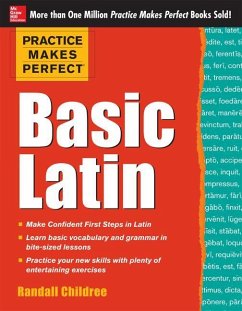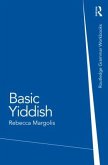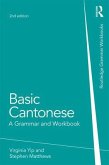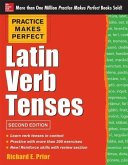Randall Childree
PMP BASIC LATIN
21,99 €
inkl. MwSt.
Versandfertig in 1-2 Wochen

11 °P sammeln
Randall Childree
PMP BASIC LATIN
- Broschiertes Buch
- Merkliste
- Auf die Merkliste
- Bewerten Bewerten
- Teilen
- Produkt teilen
- Produkterinnerung
- Produkterinnerung
Helps you learn the Latin you need. This title explains one or two language concepts and supports with many clear examples. It helps you master: basic grammar; high-frequency vocabulary; declensions and conjugations; numbers; imperative and subjunctive moods; irregular verbs; and more.
Andere Kunden interessierten sich auch für
![Basic Yiddish Basic Yiddish]() Rebecca Margolis (USA University of Ottowa)Basic Yiddish51,99 €
Rebecca Margolis (USA University of Ottowa)Basic Yiddish51,99 €![Basic Cantonese Basic Cantonese]() Virginia Yip (The Chinese University of Hong Kong.)Basic Cantonese50,99 €
Virginia Yip (The Chinese University of Hong Kong.)Basic Cantonese50,99 €![PMP LATIN VRB TNS 2E PMP LATIN VRB TNS 2E]() Richard PriorPMP LATIN VRB TNS 2E20,99 €
Richard PriorPMP LATIN VRB TNS 2E20,99 €![Minimus Pupil's Book Minimus Pupil's Book]() Barbara BellMinimus Pupil's Book18,99 €
Barbara BellMinimus Pupil's Book18,99 €![Colloquial Afrikaans Colloquial Afrikaans]() Bruce DonaldsonColloquial Afrikaans54,99 €
Bruce DonaldsonColloquial Afrikaans54,99 €![Colloquial Lithuanian Colloquial Lithuanian]() Meilute RamoniereColloquial Lithuanian66,99 €
Meilute RamoniereColloquial Lithuanian66,99 €![Hiyaku Hiyaku]() Shigeru Eguchi (USA Columbia University)Hiyaku80,99 €
Shigeru Eguchi (USA Columbia University)Hiyaku80,99 €-
-
-
Helps you learn the Latin you need. This title explains one or two language concepts and supports with many clear examples. It helps you master: basic grammar; high-frequency vocabulary; declensions and conjugations; numbers; imperative and subjunctive moods; irregular verbs; and more.
Hinweis: Dieser Artikel kann nur an eine deutsche Lieferadresse ausgeliefert werden.
Hinweis: Dieser Artikel kann nur an eine deutsche Lieferadresse ausgeliefert werden.
Produktdetails
- Produktdetails
- Practice Makes Perfect
- Verlag: McGraw-Hill Professional
- Seitenzahl: 242
- Erscheinungstermin: 6. März 2014
- Englisch, Latein
- Abmessung: 280mm x 216mm x 13mm
- Gewicht: 570g
- ISBN-13: 9780071821414
- ISBN-10: 0071821414
- Artikelnr.: 39373718
- Herstellerkennzeichnung
- Libri GmbH
- Europaallee 1
- 36244 Bad Hersfeld
- gpsr@libri.de
- Practice Makes Perfect
- Verlag: McGraw-Hill Professional
- Seitenzahl: 242
- Erscheinungstermin: 6. März 2014
- Englisch, Latein
- Abmessung: 280mm x 216mm x 13mm
- Gewicht: 570g
- ISBN-13: 9780071821414
- ISBN-10: 0071821414
- Artikelnr.: 39373718
- Herstellerkennzeichnung
- Libri GmbH
- Europaallee 1
- 36244 Bad Hersfeld
- gpsr@libri.de
Randall Childree, PhD, has taught Latin and Roman history to classics lovers for several years. He currently teaches at Furman University in Greenville, South Carolina.
Introduction The sounds of Latin Using a Dictionary 1 VerbsThe present
tense of 1st, 2nd, and 4th conjugation verbs The most common 1st, 2nd, and
4th conjugation verbs 2 The present tense of verbs of the 3rd and 3rd -io
conjugations The most common 3rd and 3rd -io conjugation verbs 3 Nouns
Case endings Nominative and accusative The 1st declension The most common
1st declension nouns 4 More case endings: genitive, dative, ablative, and
vocative 5 Personal pronouns 6 2nd declension nouns The most common 2nd
declension nouns 7 Adjectives that end in -us -a -um Noun and adjective
agreement The most common -us -a -um adjectives 8 The irregular verb sum
Predicate sentences 9 The imperfect tense 10 The future tense 11 The
imperfect and future tense of sum The irregular verb possum The present
active infinitive 12 Prepositions and their cases The most common
prepositions 13 3rd declension nouns i-stem nouns The most common 3rd
declension nouns 14 3rd declension adjectives The most common 3rd
declension adjectives 15 4th declension nouns The most common 4th
declension nouns 16 5th declension nouns The most common 5th declension
nouns 17 Substantive adjectives 18 More uses of the ablative case 19 The
perfect tense 20 The pluperfect and future perfect tenses 21 The
demonstrative pronouns hic haec hoc, ille illa illud, and is ea id 22
Reflexive pronouns Reflexive adjectives 23 The relative pronoun Relative
clauses 24 Voice The passive voice The present passive 25 The imperfect and
future passive 26 The perfect passive 27 The pluperfect and future perfect
passive Deponent verbs The most common deponent verbs 28 Infinitives
Indirect statement 29 The ablative absolute 30 Participles 31 Expressions
of time 32 Numbers 33 Questions 34 Mood The imperative mood 35 The
subjunctive mood 36 Independent subjunctives Jussives 37 Dependent
subjunctives Purpose clauses 38 Cum-clauses 39 Conditional sentences 40
Indirect questions Answer Key Glossary: The 1000 (or so) most common Latin
words
tense of 1st, 2nd, and 4th conjugation verbs The most common 1st, 2nd, and
4th conjugation verbs 2 The present tense of verbs of the 3rd and 3rd -io
conjugations The most common 3rd and 3rd -io conjugation verbs 3 Nouns
Case endings Nominative and accusative The 1st declension The most common
1st declension nouns 4 More case endings: genitive, dative, ablative, and
vocative 5 Personal pronouns 6 2nd declension nouns The most common 2nd
declension nouns 7 Adjectives that end in -us -a -um Noun and adjective
agreement The most common -us -a -um adjectives 8 The irregular verb sum
Predicate sentences 9 The imperfect tense 10 The future tense 11 The
imperfect and future tense of sum The irregular verb possum The present
active infinitive 12 Prepositions and their cases The most common
prepositions 13 3rd declension nouns i-stem nouns The most common 3rd
declension nouns 14 3rd declension adjectives The most common 3rd
declension adjectives 15 4th declension nouns The most common 4th
declension nouns 16 5th declension nouns The most common 5th declension
nouns 17 Substantive adjectives 18 More uses of the ablative case 19 The
perfect tense 20 The pluperfect and future perfect tenses 21 The
demonstrative pronouns hic haec hoc, ille illa illud, and is ea id 22
Reflexive pronouns Reflexive adjectives 23 The relative pronoun Relative
clauses 24 Voice The passive voice The present passive 25 The imperfect and
future passive 26 The perfect passive 27 The pluperfect and future perfect
passive Deponent verbs The most common deponent verbs 28 Infinitives
Indirect statement 29 The ablative absolute 30 Participles 31 Expressions
of time 32 Numbers 33 Questions 34 Mood The imperative mood 35 The
subjunctive mood 36 Independent subjunctives Jussives 37 Dependent
subjunctives Purpose clauses 38 Cum-clauses 39 Conditional sentences 40
Indirect questions Answer Key Glossary: The 1000 (or so) most common Latin
words
Introduction The sounds of Latin Using a Dictionary 1 VerbsThe present
tense of 1st, 2nd, and 4th conjugation verbs The most common 1st, 2nd, and
4th conjugation verbs 2 The present tense of verbs of the 3rd and 3rd -io
conjugations The most common 3rd and 3rd -io conjugation verbs 3 Nouns
Case endings Nominative and accusative The 1st declension The most common
1st declension nouns 4 More case endings: genitive, dative, ablative, and
vocative 5 Personal pronouns 6 2nd declension nouns The most common 2nd
declension nouns 7 Adjectives that end in -us -a -um Noun and adjective
agreement The most common -us -a -um adjectives 8 The irregular verb sum
Predicate sentences 9 The imperfect tense 10 The future tense 11 The
imperfect and future tense of sum The irregular verb possum The present
active infinitive 12 Prepositions and their cases The most common
prepositions 13 3rd declension nouns i-stem nouns The most common 3rd
declension nouns 14 3rd declension adjectives The most common 3rd
declension adjectives 15 4th declension nouns The most common 4th
declension nouns 16 5th declension nouns The most common 5th declension
nouns 17 Substantive adjectives 18 More uses of the ablative case 19 The
perfect tense 20 The pluperfect and future perfect tenses 21 The
demonstrative pronouns hic haec hoc, ille illa illud, and is ea id 22
Reflexive pronouns Reflexive adjectives 23 The relative pronoun Relative
clauses 24 Voice The passive voice The present passive 25 The imperfect and
future passive 26 The perfect passive 27 The pluperfect and future perfect
passive Deponent verbs The most common deponent verbs 28 Infinitives
Indirect statement 29 The ablative absolute 30 Participles 31 Expressions
of time 32 Numbers 33 Questions 34 Mood The imperative mood 35 The
subjunctive mood 36 Independent subjunctives Jussives 37 Dependent
subjunctives Purpose clauses 38 Cum-clauses 39 Conditional sentences 40
Indirect questions Answer Key Glossary: The 1000 (or so) most common Latin
words
tense of 1st, 2nd, and 4th conjugation verbs The most common 1st, 2nd, and
4th conjugation verbs 2 The present tense of verbs of the 3rd and 3rd -io
conjugations The most common 3rd and 3rd -io conjugation verbs 3 Nouns
Case endings Nominative and accusative The 1st declension The most common
1st declension nouns 4 More case endings: genitive, dative, ablative, and
vocative 5 Personal pronouns 6 2nd declension nouns The most common 2nd
declension nouns 7 Adjectives that end in -us -a -um Noun and adjective
agreement The most common -us -a -um adjectives 8 The irregular verb sum
Predicate sentences 9 The imperfect tense 10 The future tense 11 The
imperfect and future tense of sum The irregular verb possum The present
active infinitive 12 Prepositions and their cases The most common
prepositions 13 3rd declension nouns i-stem nouns The most common 3rd
declension nouns 14 3rd declension adjectives The most common 3rd
declension adjectives 15 4th declension nouns The most common 4th
declension nouns 16 5th declension nouns The most common 5th declension
nouns 17 Substantive adjectives 18 More uses of the ablative case 19 The
perfect tense 20 The pluperfect and future perfect tenses 21 The
demonstrative pronouns hic haec hoc, ille illa illud, and is ea id 22
Reflexive pronouns Reflexive adjectives 23 The relative pronoun Relative
clauses 24 Voice The passive voice The present passive 25 The imperfect and
future passive 26 The perfect passive 27 The pluperfect and future perfect
passive Deponent verbs The most common deponent verbs 28 Infinitives
Indirect statement 29 The ablative absolute 30 Participles 31 Expressions
of time 32 Numbers 33 Questions 34 Mood The imperative mood 35 The
subjunctive mood 36 Independent subjunctives Jussives 37 Dependent
subjunctives Purpose clauses 38 Cum-clauses 39 Conditional sentences 40
Indirect questions Answer Key Glossary: The 1000 (or so) most common Latin
words







